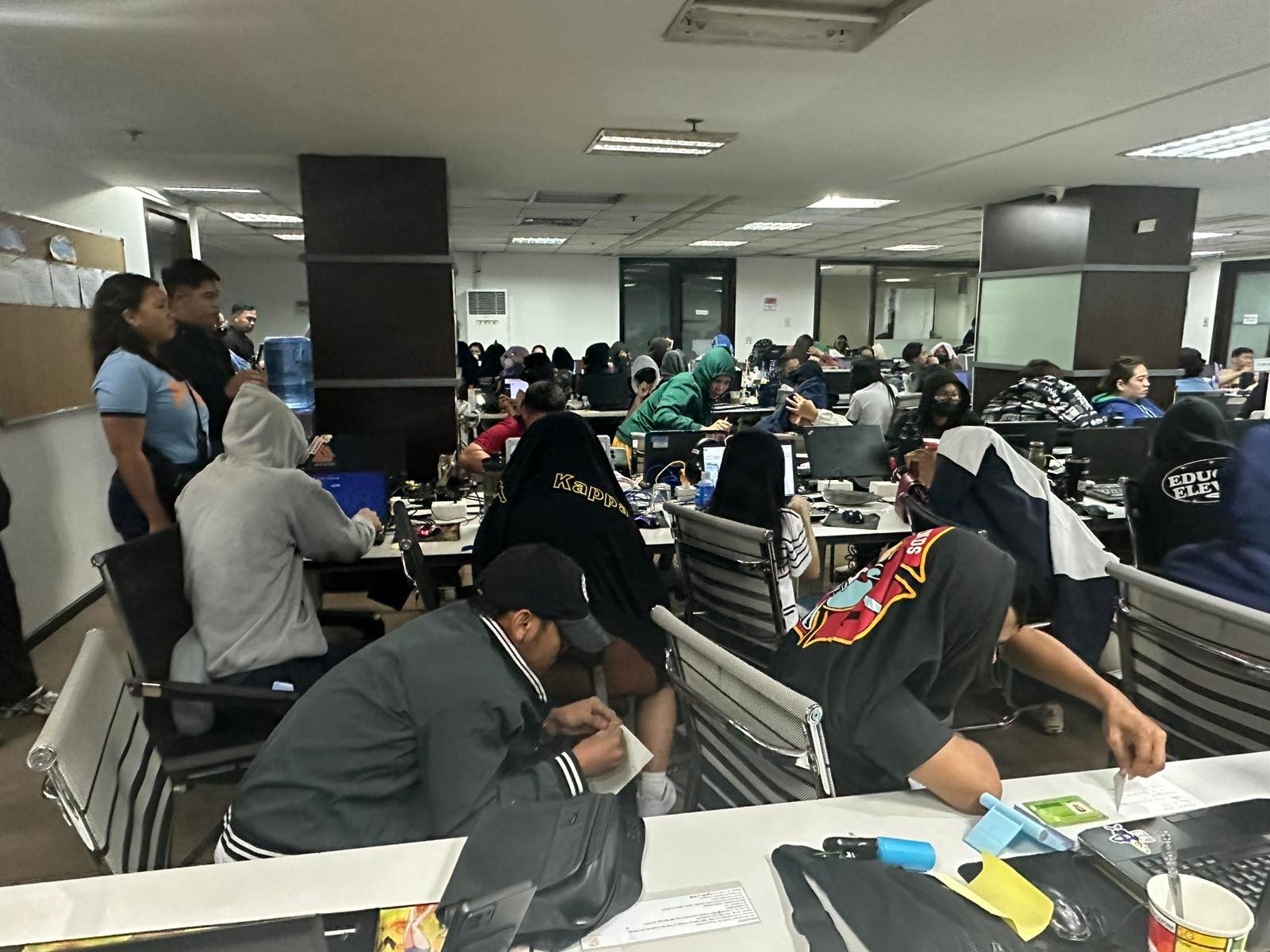SUMMARY
This is AI generated summarization, which may have errors. For context, always refer to the full article.

PAMPANGA, Philippines – Law enforcers raided the office of a loan collection firm in One Salcedo Center, Salcedo Village, Makati City on Friday, October 20, and held for questioning 255 of its employees for their alleged involvement in online harassment scam.
A joint team of Philippine National Police Anti-Cybercrime Group, Presidential Anti-Organized Crime Commission (PAOCC), and Securities and Exchange Commission (SEC) swooped down on the Golden Koi Lending Company Incorporated based on a warrant to seize, search and examine computer data issued by the Manila Regional Trial Court Branch 24 Judge Maria Victoria Soriano-Villadolid.
Based on the report obtained by Rappler, the warrant stemmed from several complaints filed by clients who used online lending apps Wow Pera, Zippeso, Valley Loan, and Lemon Loan.
One of the complainants said he had been receiving online harassment from Golden Koi after he failed to pay his monthly dues, the report says.

PAOCC spokesperson Winston Casio said one of the complainants received harassment messages via email and social media that have also reached relatives, friends, as well as acquaintances.
“The victim sent us screenshots of the harassment messages he was getting in social media and the email. We were able to find out that even relatives and friends, even mere acquaintances of the victims have been receiving messages from Golden Koi,” Casio told Rappler in an interview on Friday.
PAOCC also revealed that Golden Koi used to be Treasure Bowl Fintech Lending Corp., a “shady firm with a long list of complaints (which) unexpectedly vanished earlier this year,” said PAOCC.
“They were given registration but they were not allowed to operate yet. They should have waited for the lifting of the SEC moratorium,” said PAOCC.
The 255 workers were comprised of 251 Filipinos, and four foreign nationals – two Malaysians, a Chinese national, and a Taiwanese who is the lone de facto manager. They are temporarily held for questioning for alleged violations of Republic Act 10175 or the Cybercrime Prevention Act, RA 11765 or the Financial Products and Services Consumer Protection Act, and RA 11394 or the SIM Registration Act, said PAOCC.
“They are not technically detained. They are being held for questioning. If we have enough evidence that would constitute probable cause, we will file corresponding criminal charges against them,” Casio said.
PH as scam hotspot
PAOCC said the Philippines has already become one of the hotspots of scamming industries in Southeast Asia as scam operations continue to become more prevalent in the country.
PAOCC director Jay Ison said the government and business sector should enhance employment opportunities for job seekers not to fall to the lure of applying to any of the scam industries.
“The government and business sector should enhance employment opportunities so that our working generation will not be enticed to work in this kind of industry. This is a social justice issue. You need to survive first before you follow government rules. Although for businessmen, the issue is not about survival, rather greed,” said Ison.
Ison added that scam businesses will continue as vulnerable sectors could be exploited by unscrupulous entities such as online lending companies.
“We’ve been going against illegal POGOs, scam operations, it’s like they are mushrooming all over the country. It would be to say that we have become one of the scamming hotspots in Southeast Asia. That’s a rational assessment,” Casio added.
“A scam is basically just a glorified online form of estafa. So you promise someone something and you fail to give that person what is due, then there is a series of pretenses, as well as elements. If someone offers you something then it’s too good to be true, then it’s not true. That is most likely a scam.”
Casio also said that PAOCC may have limited operational capabilities. However, they have received scam reports from major metropolitan areas across the country such as CALABARZON, Cagayan, Central Luzon, and Visayas. – Rappler.com
Add a comment
How does this make you feel?
![[ANALYSIS] Not all REITs are created equal](https://www.rappler.com/tachyon/2024/06/tl-not-all-reits-are-created-equal-06012024.jpg?resize=257%2C257&crop=233px%2C0px%2C720px%2C720px)

![[ANALYSIS] Search for stocks that continue to sizzle](https://www.rappler.com/tachyon/2024/04/search-stocks-that-sizzle-April-5-2024.jpg?resize=257%2C257&crop_strategy=attention)




![[OPINION] From ‘Puyat’ to ‘Tulog’: Clout-chasing street signs disrespected history](https://www.rappler.com/tachyon/2024/07/gil-puyat-july-26-2024.jpg?resize=257%2C257&crop=389px%2C0px%2C1080px%2C1080px)






![[The Slingshot] Lito Patay’s 4 hours and 38 minutes of infamy](https://www.rappler.com/tachyon/2024/07/Lito-Patay-4-hours-infamy-July-19-2024.jpg?resize=257%2C257&crop=233px%2C0px%2C720px%2C720px)
There are no comments yet. Add your comment to start the conversation.